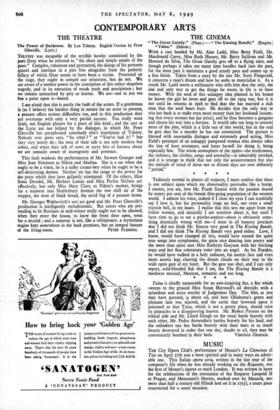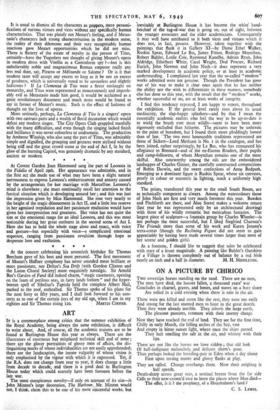MUSIC
THE City Opera Club's performance of Mozart's La Clemenza di Tito on April 27th was a most spirited and in many ways an admir- able one. This Italian opera seria, written in the last year of the composer's life when he was already working on the Requiem, was the first of Mozart's operas to reach London. It was written in haste for the celebrations of the coronation of the Emperor Leopold II at Prague, and Metastasio's libretto, worked over by Mazzola, was more than half a century old (Gluck had set it in 1752), a court piece resurrected for a court occasion.
It is usual to dismiss all the characters as puppets, mere personi- fications of various virtues and vices without any specifically human characteristics. That was plainly not Mozart's feeling, and if Metas- tasio's characters lack strong characterisation in the modern sense, the reality of their dilemmas and their very recognisably human reactions gave Mozart opportunities which he did not miss. There is flattery of the estate of royalty in the person of Titus, certainly—have the Yugoslays not thought of giving Mozart's opera in modern dress with Vitellia as a Cominform spy ?—but is this unbelievably noble and magnanimous Roman emperor really any less real than, say, Pizarro or Melisande or Salome ? Or is it that modern taste will accept any excess so long as it be not an excess of goodness, which is universally voted to be savourless and slightly ludicrous ? If La Clemenza di Tito were a fierce onslaught on monarchy, and Titus were represented as monotonously and improb- ably evil as Metastasio made him good, it would be acclaimed as a great revolutionary document and much more would be found to say in favour of Mozart's music. Such is the effect of fashions of thought on the lives of operas.
More seriously, perhaps, La Clemenza di Tito is a singers' opera with two castrato parts and a wealth of florid decoration which would defeat any modern singer. The City Opera Club grappled manfully with the many difficulties, and even though the singing lacked finish and brilliance it was never colourless or undramatic. The production by Ambrose Winship, who also sang the part of Titus, was admirably simple and dignified, the grouping and gestures were stylised without being stiff and the great crowd scene at the end of Act I, lit by the glow of the burning Capitol, was genuinely dramatic by any standard, ancient or modern.
a*
At Covent Garden Joan Hammond sang the part of Leonora in the Fidelio of April 29th. Her appearance was admirable, and in the first act she made use of what may have been a slight natural nervousness to express Leonora's embarrassment and anxiety caused by the arrangements for her marriage with Marcelline. Leonora's mind is elsewhere ; she must continually recall her attention to the farcical situation which is developing around her ; and this was just the impression given by Miss Hammond. She rose very nearly to the height of the tragic denouement in Act II, and a little less reserve in her agonised trepidation and her passionate exultation would have given her interpretation real greatness. Her voice has not quite the size or the emotional range for an ideal Leonora, and this was most noticeable during her great outburst in the second scene of Act I. Here she has to hold the whole stage alone and enact, with voice and gesture—but especially with voice—a complicated emotional sequence, ranging from passionate revulsion through hope to desperate love and exaltation.
* * * * At the concert celebrating his seventieth birthday Sir Thomas Beecham gave of his best and most personal. The first movement of Mozart's Haffner symphony has never sounded more brilliant or more passionate, nor Delius's Sea Drift (with Gordon Clinton and the Luton Choral Society) more exquisitely nostalgic. Sir Arnold Box's Garden of Fand did indeed charm, "magic casements, opening on the foam of perilous seas, in faery lands forlorn" and the hyper- borean spell of Sibelius's Tapiola held the complete Albert Hall, packed to the roof, enthralled. Sir Thomas spoke of his plans for the next forty or fifty years, and I shall look forward to his con- certs as to one of the certain joys of my old age, when I am in my
eighties and Sir Thomas rising 120. MARTIN COOPER.







































 Previous page
Previous page